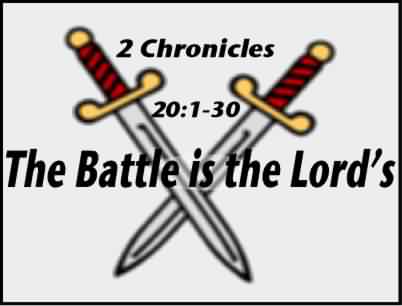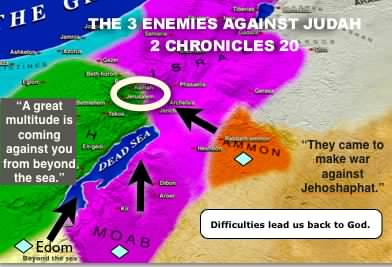
The Battle is the Lord’s: Jehoshaphat Prays to the Lord
2 Chronicles 20:1-30
Introduction to Prayer: 2 Chronicles 20:1-30A) The Urgent Need for Prayer (2 Chronicles 20:1-2)
B) The Proper Time for Prayer (2 Chronicles 20:3-4)
C) The Needed Substance of Prayer (2 Chronicles 20:5-13)
D) The Delightful Answer to Prayer (2 Chronicles 20:14-19)
E) The Required Faith for Prayer (2 Chronicles 20:20-23)
F) The Blessed Reward of Prayer (2 Chronicles 20:24-30)
Summary on Prayer
Study Questions on 2 Chronicles 20:1-30
Introduction to Prayer
Paul J. Bucknell
Prayer is often something that is hidden away. It is true that Jesus instructed His disciples to go into a closet to pray, but we also see the early church holding powerful joint prayer meetings. Either they were blatantly disobeying Jesus, or as I understood it Jesus’ words applied to another situation where a person was looking for personal recognition through their prayers (Matthew 6:1). Of course, getting recognition for lengthy, spiritual or eloquent prayers should not be our purpose for praying. It doesn’t matter if you are a leader in church or not, we can all default to fleshly religion if we are not careful. This occurs when we pray for ulterior motives.
Those who do not have a healthy relation with God cannot have genuine prayers. On the other hand, when a person or a church for that matter are greatly concerned for God’s will, then they are not focused on their individual needs but on God’s will: bringing God’s kingdom to earth. We are to have a sincere discontent for what is happening around us. There is not enough love, not enough joy and just too much evil and selfishness around us.
Many people are trying to be spiritual but just are not clear on how to do it. This is where the Bible comes in and helps us on two major fronts.
(1) First of all, and most importantly, God helps us get into the proper relationship with God that enables us to pray. Even if we know lots of things about praying, when, how, why, motives, etc., we need a real relationship with God. Without a network card, one cannot properly receive incoming information from another computer. And without having a relationship with God, there is no way we can properly pray. There are many religions who pray, and even more people without a major religion that pray. But this is all to no avail without a relationship with God through Jesus Christ. Some religions copy the Christian methods but this doesn’t work. Paul in 1 Corinthians 2 says that we need a spiritual network set up. That is analogous to salvation, where man who did know God now knows God and has the privilege of speaking with Him.
(2) Secondly, the Lord who understands all things comes and helps us to maintain a good speaking relationship with Him. There are a lot of things that interfere with prayer. When my network went down the other day, I couldn’t figure out how to set it up. I had to call a tech advisor who understood the network. It would not have done to call the nearby restaurant or even an insurance agent. Since God has set up the spiritual network, it would be foolish to go anywhere else to get the information we need to maintain its proper operation since He always is free and available.
By examining the prayers of others and God’s interpretation of what happened, we are able to clarify our picture of how prayer works. We will not be talking much about initiating our relationship with God. Although we are stepping into a scene from long ago, these were the people of God. They already had forgiveness from God and had entered into a covenant with God. If you want God to hear your prayers, you must first come to have a relationship with Him through Jesus Christ.
But having said this, we have a lot to learn about prayer. A couple of questions we might ask of prayer are, “Why does God want us to pray?” “When should I pray?” “How should I pray?” “How does faith play a part in prayer?”
Some of these Old Testament stories are thoroughly fresh and stimulating. We are busily involved in our walk of life, writing papers, doing research, caring for children, etc. God often uses these old records to bring new life into our stale lives. He is very interested in our prayers because it is our basic communication line with Him. Let’s now turn to 2 Chronicles 20 and see six things we can learn about prayer.
A) The Urgent Need for Prayer (2 Chronicles 20:1-2)
Difficulties lead us back to God.
God always hopes difficult situations draw His people closer to Him. Satan of course wants to use the same circumstances to turn us from God. If we closely read our Bibles, we will see this same situation occur again and again. God wants us to learn this lesson because it directly impacts our lives. You cannot be considered a strong believer until you know it. Why? Simply because without it Satan will ensnare you.
Just think about this situation. Here we have some old and formidable enemies that arose against Jehoshaphat. Who were these enemies? Interestingly, all three enemies were distant relatives that God asked them not to fight against when they first came into the Promised Land well over 500 years before. Edom is another name for Esau, Jacob (Israel’s twin brother). Moabites and Ammonites descended from Lot, Abraham’s nephew.
Thus both the daughters of Lot were with child by their father. The firstborn bore a son, and called his name Moab; he is the father of the Moabites to this day. As for the younger, she also bore a son, and called his name Ben-ammi; he is the father of the sons of Ammon to this day (Genesis 19:36-38).
 God is so patient with our sin. But when people sin, sin brings judgment into their lives and communities. He gave them plenty of time to repent. But now God was going to judge them. This seems to be a key why God judged them the way He did. He wanted them to know God was upset with their ways. They were close to the truth but rejected what they had. This is much like the dying churches around us. They had promise of victory because they knew of God’s promises. But in time they rejected the truth that they did know. We see God’s judgment all about us.
God is so patient with our sin. But when people sin, sin brings judgment into their lives and communities. He gave them plenty of time to repent. But now God was going to judge them. This seems to be a key why God judged them the way He did. He wanted them to know God was upset with their ways. They were close to the truth but rejected what they had. This is much like the dying churches around us. They had promise of victory because they knew of God’s promises. But in time they rejected the truth that they did know. We see God’s judgment all about us.
At this time, however, for God’s people the threat became a means to trust God more. It was a time when they were going to see God’s special victory. “Greater is He that is in you than he who is in the world!” The threat will always seem to overwhelm us. Notice a few phrases. “They came to make war against Jehoshaphat.” The evil one will always try to interrupt the work of God. Another phrase from these early verses is the report he heard. “A great multitude is coming against you from beyond the sea, out of Edom [better sense] and behold, they are in Hazaaon-tamar.”
I have found that a strategic part of these threats is their timing. Timing betrays strategy. Coincidence has no strategist moving the pieces about. Perhaps Hezekiah could have handled one of the enemies. But having come at the same time, Judah was being ambushed by several nations from various directions. (Actually these circumstances are better than the ones where we think we can handle but never call upon the Lord for help.) Here, however, we find that there is no chance for chance to happen! They called upon God. Too bad we only call upon the Lord when what we consider precious is threatened. What if we called upon Him in the same way for other noble purposes?
Application: Have you ever encountered such a great foe that overwhelmed you? Of course, this is a nation and so it was on the national level. But for us, it will be something that causes us alarm. We can’t find an easy solution. I assure you it is time to call upon the Lord. Frankly, it doesn’t matter what the situation is. It might be something totally unexpected. It might be something that has been going on and on. Your marriage might be facing some critical problems. You see your eyes dangling in front of immoral scenes. Your anger is hurting those you love. Or on a greater front, you might see that you see all the lost from the nations but don’t know how to get them to your cell group. Get desperate not only for yourself, but for others. A need made aware is a special occasion through which we can see the glorious work of God. We have too much work of man–it is always poorly done much like a new house that has leaking problems. Let us turn our eyes to the Lord.
Next => B) The Proper Time for Prayer (2 Chronicles 20:3-4) Fears always should lead us to trust God.
Introduction to Prayer: 2 Chronicles 20:1-30
A) The Urgent Need for Prayer (2 Chronicles 20:1-2) Difficulties lead us back to God.
B) The Proper Time for Prayer (2 Chronicles 20:3-4) Fears always should lead us to trust God. C) The Needed Substance of Prayer (2 Chronicles 20:5-13) Prayer is where our trust is given to God.
D) The Delightful Answer to Prayer (2 Chronicles 20:14-19) Answers to prayer come when God speaks.
E) The Required Faith for Prayer (2 Chronicles 20:20-23) We always are asked to prove our faith.
F) The Blessed Reward of Prayer (2 Chronicles 20:24-30) God always blesses those who seek Him.
Study Questions on 2 Chronicles 20:1-30
 Most of BFF articles such as this one is nicely formatted for printing. Check out the great number of articles on the BFF Biblical Training Libraries all for one low cost. Make sure you check out the deal! Most of BFF articles such as this one is nicely formatted for printing. Check out the great number of articles on the BFF Biblical Training Libraries all for one low cost. Make sure you check out the deal! |
Biblical Foundations for Freedom
Paul J. Bucknell